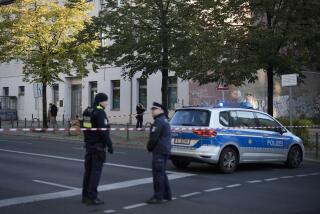ETHNIC DISCORD : Turkish-Kurd Battle Spreads to Germany
- Share via
BERLIN — A renewed campaign of arson attacks on Turkish family businesses, mosques and social clubs in Germany is raising concerns about how far militant Kurds living in Germany will go in their fight for separation from Turkey.
As of Thursday, there had been at least one attack per night for the last 10 nights, at Turkish homes, businesses, community centers or other sites identified with Turkish life.
Though no one has claimed responsibility, police say many of the torchings appear to be the work of Kurdish insurgents, 15 of whom occupied a German television station last week, demanding air time to describe the “inhumane situation” in Turkey.
The new bombings are reminiscent of another anti-Turk arson campaign in Germany earlier this year, after Turkey sent troops into northern Iraq in an attempt to root out Kurdish rebel camps.
Some of the current bombings have not ignited fires, but others have burned whole buildings to the ground. So far, there have been no serious injuries.
But the attacks have terrified Germany’s large population of Turkish guest workers and their families. In one attack, bombers tossed a gasoline bomb through the ground-floor window of a Turkish home in Bochum.
Native-born Germans have been able to distance themselves from the attacks, and from the troubles in Turkey. The insurgent Kurds have limited their attacks to the Turkish community.
But German authorities said they have new evidence that Kurdish hard-liners may be planning to hit German targets, particularly police officers.
Germany has traditionally been Turkey’s closest European ally, and is home to almost 2 million Turks. Many were born here, speak fluent German and have little connection to the old country but are still Turkish citizens under German law.
About 450,000 of Germany’s Turks are ethnic Kurds, from Turkey’s southeastern mountainous region bordering Iran, Iraq and Syria. They practice Sunni Islam, speak a language related to Persian, and say they suffer discrimination in Turkey unless they abandon Kurdish ways.
Of Germany’s Kurds, only about 8,000 are believed to belong to the separatist Kurdistan Workers Party, or PKK. The PKK was banned in Germany in 1993 after a string of violent protests, but police say it is still active here.
German authorities have been divided on how to address the problem. Security officials are eager to crack down on foreigners who bring problems into Germany, and the federal government voted in March to proceed with deportations of outlaw Kurds.
*
But some state governments--which are empowered to carry out the deportations--have hesitated to send the militants home, in light of reports of torture and wrongful imprisonment of Kurds returned to Turkey.
Police have speculated that the latest round of bombings was provoked by Germany’s attempts to extradite a senior PKK official, Kani Yilmaz, from Britain. German prosecutors want to try Yilmaz in connection with a huge wave of bombings in 1993.
Further heightening tensions was the death last week of a 41-year-old Kurdish mother of five, Gulnaz Baghistani, who was on a hunger strike with about 200 other Kurds in Berlin as part of an effort to pressure Ankara to the negotiating table.
The circumstances of Baghistani’s death are disputed, with police saying she died from her eight-day strike but Kurdish sympathizers saying she was fatally roughed up by German police.
More to Read
Sign up for Essential California
The most important California stories and recommendations in your inbox every morning.
You may occasionally receive promotional content from the Los Angeles Times.












